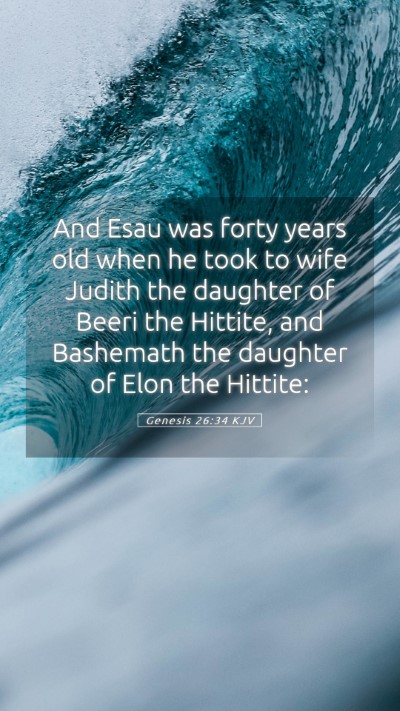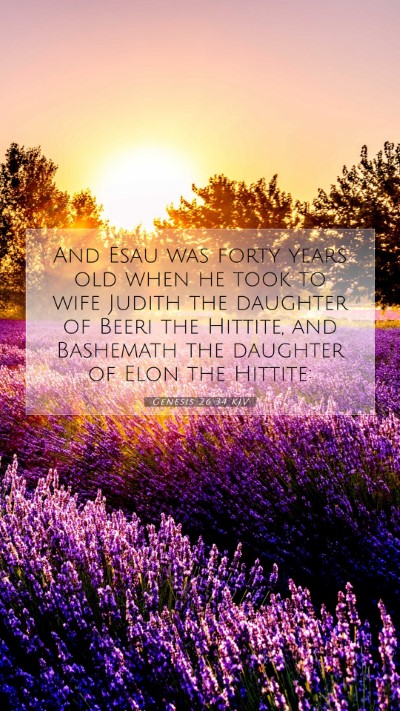Bible Verse Meaning: Genesis 26:34
Genesis 26:34 states: "And Esau was forty years old when he took to wife Judith the daughter of Beeri the Hittite, and Bashemath the daughter of Elon the Hittite."
In exploring the meaning of Bible verses, particularly Genesis 26:34, we can derive significant insights regarding familial and cultural dynamics in the Biblical context.
Overall Summary
This verse highlights the marriage choices of Esau, the son of Isaac and Rebekah. His decision to marry Hittite women reflects a departure from the traditions upheld by his family, raising questions about the implications of such unions.
Understanding Scripture: Insights from Commentaries
-
Matthew Henry's Commentary:
Henry points out that Esau's choice of wives demonstrates a lack of regard for his family's values and covenantal faith, indicating a broader neglect of the inheritance of the promise given to Abraham. The Hittites were not part of the covenant people, and marrying outside the faith is portrayed negatively, suggesting rebellion against parental authority and spiritual heritage.
-
Albert Barnes' Notes:
Barnes elaborates that Esau's marriages were a source of bitterness for Isaac and Rebekah. The choice signifies the strife that can arise from wise parental influence being disregarded. Through historical context, Barnes emphasizes that Esau's decisions symbolize futility and the loss of spiritual heritage, which would have profound implications for future generations.
-
Adam Clarke's Commentary:
Clarke notes the significance of the names of Esau’s wives, suggesting they were symbolic of the traits found in Esau's character—fleshly, impulsive, and disregarding the sacred. He posits that these marriages foreshadow the conflict and division that would arise within the tribe of Israel and indicates how Esau’s actions lead him further away from God's intended path for his life.
In-depth Analysis and Historical Context
In-depth Bible verse analysis reveals the cultural context of marriage in ancient Israel. Marriages were often arranged and should ideally align with the spiritual and moral values of the family. Esau’s marriages represent a blend of cultures that could threaten the integrity of God's covenant.
Application of Bible Verses
Understanding difficult Bible passages like this helps modern readers reflect on the importance of marrying within a shared belief system and considering the values passed from generation to generation. The application of Bible verses encourages a quest for holiness and unity in faith-based relationships.
Biblical Exegesis Techniques
When interpreting this verse, consider examining specific Bible study tools that provide background on the Hittites, their relationship with Israel, and how personal decisions can influence broader familial and societal contexts.
Cross References
This verse is related to several other passages that further illuminate its meaning:
- Genesis 24:3-4: Abraham instructs his servant to find a wife for Isaac from his own kindred, emphasizing the significance of familial faith.
- Genesis 28:1-2: Isaac advises Jacob not to take a wife from the Hittite women, reinforcing the lessons learned from Esau’s choices.
- Exodus 34:16: God warns against intermarriage with foreign nations lest the Israelites be led astray.
Conclusion
In conclusion, Genesis 26:34 serves as a potent reminder of the importance of aligning personal choices with a faith-driven approach that honors both God and family. By examining this verse, we gain valuable Bible study insights that can significantly inform our understanding of spiritual heritage, the complexities of relationships, and the profound impact of our choices.


